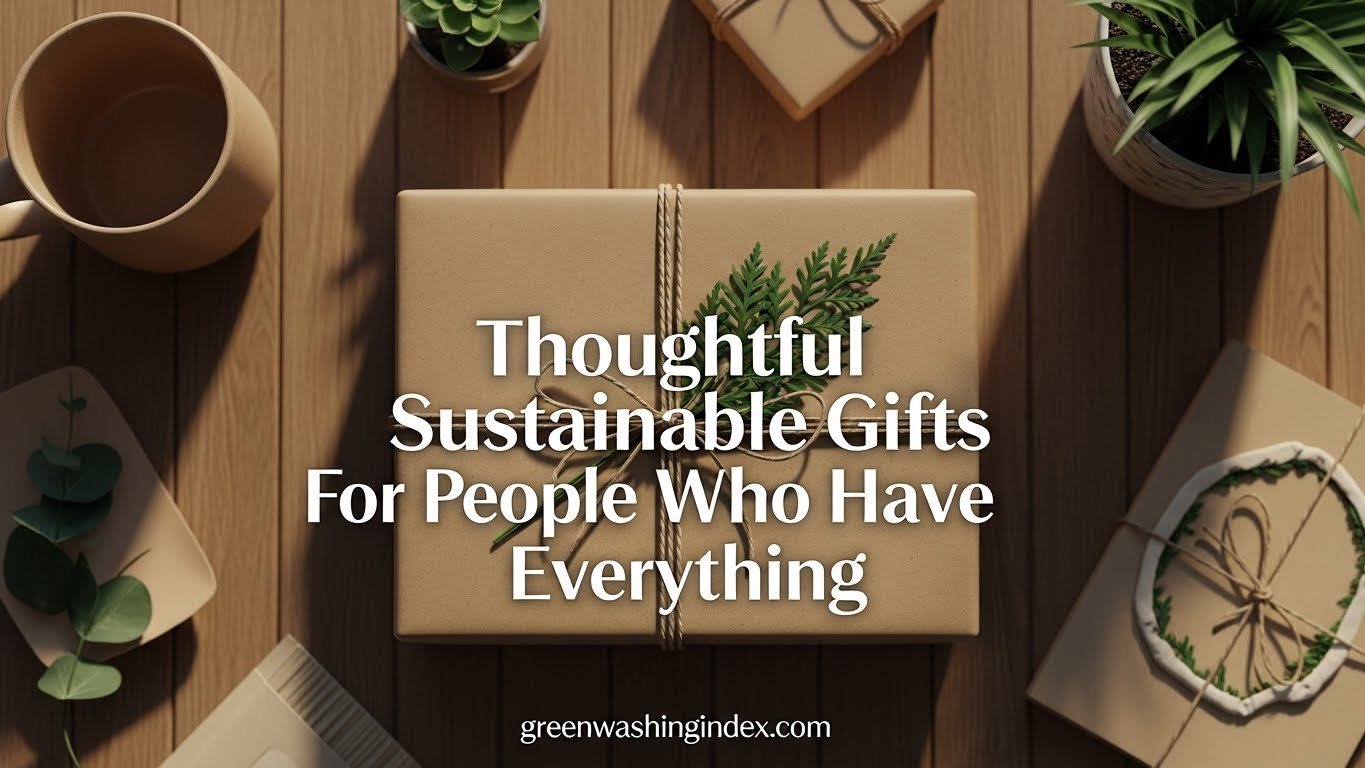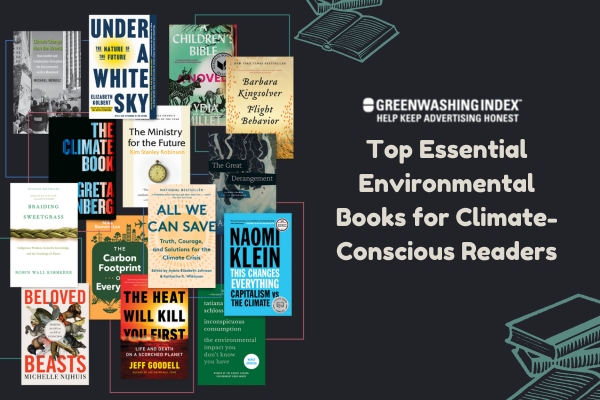

Suppose you’re sipping your morning coffee, wondering how you can make a difference in the world. The climate crisis looms large, and you’re eager to learn more about sustainable living. But where do you start? Look no further. Our list of the 10 Best Environmental Books for Your Next Climate Read is here to guide you on this journey.
These environmental books will not only educate you on zero waste and eco-friendly practices but also inspire you to embrace reusable products and waste reduction. So, let’s get into the captivating world of environmental books and literature and discover the insights each book has to offer.
This selection of “10 Best Environmental Books” invites readers into a journey of understanding our planet’s most urgent environmental challenges. Through a variety of perspectives, these environmental books explore topics like zero-waste lifestyles, climate change, and environmental justice, offering both inspiration and practical solutions.
Whether you’re drawn to indigenous wisdom, scientific approaches, or activism, these reads provide a comprehensive view of how individuals and societies can make a positive impact on the Earth.
Braiding Sweetgrass explores the intricate bond between humans and the natural world, where Kimmerer beautifully articulates the wisdom derived from both scientific inquiry and Indigenous knowledge. Through vivid storytelling, she invites readers to experience the profound lessons learned from plants and ecosystems.
Kimmerer highlights how understanding land as a living entity fosters a relationship grounded in respect and reciprocity. Her work resonates with readers by emphasizing the importance of gratitude, urging them to cultivate a sense of belonging and responsibility towards nature.
By bridging these two realms of knowledge, Kimmerer inspires a reconnection with the Earth, promoting a more harmonious coexistence with the environment.
Key Considerations:
In The Intersectional Environmentalist, Leah Thomas emphasizes that true environmentalism cannot ignore social justice issues. She argues that environmental degradation disproportionately affects marginalized communities and that a holistic approach is necessary for effective climate action.
Through personal anecdotes and reflections, Thomas encourages readers to examine their privileges and biases, pushing for a movement that is inclusive and representative. By amplifying the voices of those often overlooked, she fosters a sense of urgency in addressing systemic injustices linked to environmental issues.
Thomas’s passionate advocacy for an intersectional approach reshapes the environmental discourse, urging us to recognize that the fight for a sustainable planet must also champion social equity.
Key Considerations:
All We Can Save serves as a powerful tribute to the leadership of women in the climate movement. Dr. Ayana Elizabeth Johnson curates a collection that not only showcases diverse voices but also highlights the unique perspectives and strengths women bring to environmental advocacy.
Through essays, poetry, and art, the anthology reflects the urgency of the climate crisis while fostering a sense of hope and community among activists. By emphasizing the need for inclusive dialogues and collective action, Johnson inspires readers to envision a future where everyone plays a vital role in combating climate change.
This book ultimately celebrates the resilience and creativity of women, urging a reimagining of leadership in the quest for environmental justice.
Key Considerations:
In The Climate Book, Greta Thunberg delivers a compelling narrative that blends scientific research with a call for immediate action. She articulates the gravity of the climate crisis, providing insights into its causes and consequences while emphasizing the role of individuals and governments in addressing this global challenge.
Thunberg critiques superficial environmental initiatives, advocating for transparency and accountability in climate action. Her straightforward yet impassioned approach resonates with readers, urging them to hold leaders accountable and actively engage in sustainable practices.
Through her work, Thunberg reinforces the idea that understanding the science behind climate change is essential for effective advocacy and meaningful progress towards a sustainable future.
Key Considerations:
Saving Us presents a unique perspective on climate communication, focusing on the importance of empathy and shared values in engaging skeptics. Katharine Hayhoe emphasizes that climate conversations should prioritize understanding rather than confrontation, fostering a sense of commonality among individuals.
Through relatable anecdotes and clear explanations of climate science, she equips readers with tools to discuss environmental issues constructively. Hayhoe’s approach encourages dialogue that bridges divides, emphasizing that everyone can play a role in climate action regardless of their beliefs.
By highlighting the power of conversation and connection, she inspires readers to approach the climate crisis collaboratively, fostering a more inclusive and effective environmental movement.
Key Considerations:
Project Drawdown offers an optimistic outlook on climate solutions, showcasing a wide array of strategies to combat global warming. Paul Hawken meticulously details over 100 actionable solutions, encouraging readers to see the potential for change at both individual and collective levels.
The book underscores the interconnections between various solutions, emphasizing that no single approach can resolve the climate crisis. Hawken’s focus on education, particularly for girls in developing nations, underscores the transformative power of knowledge in fostering sustainability.
By presenting a hopeful vision for the future, Project Drawdown empowers readers to take informed action and participate in reversing climate change through practical, achievable steps.
Key Considerations:
Climate Optimism shifts the narrative around climate change from despair to hope, offering a refreshing perspective on environmental activism. Zahra Biabani and Christina Figueres present success stories and positive developments in the fight against climate change, demonstrating that progress is possible even in challenging times.
By sharing inspiring “Weekly Earth Wins,” they encourage readers to maintain a positive outlook while engaging in sustainable practices. The authors argue that optimism is a vital component of effective environmental activism, providing the motivation needed to drive meaningful change.
Their work fosters resilience and creativity, inspiring individuals to envision a brighter future and take proactive steps toward achieving environmental goals.
Key Considerations:
In A Terrible Thing to Waste, Harriet A. Washington confronts the issue of environmental racism, revealing how systemic inequalities disproportionately affect marginalized communities. Through a thorough analysis of environmental hazards and their impacts, Washington illustrates the urgent need for reforms that address these disparities.
Washington’s compelling narrative sheds light on the often-overlooked experiences of those living in polluted areas, urging a collective response to safeguard the health and well-being of vulnerable populations. Her work is a powerful call for social justice within the environmental movement.
Key Considerations:
Toxic Communities offers an in-depth exploration of environmental injustice, focusing on how low-income and minority communities bear the brunt of pollution and environmental degradation.
Dorceta E. Taylor investigates the historical and political factors that have led to these inequities, highlighting the connection between systemic racism and environmental harm. Through meticulous research, Taylor reveals the complexities of the environmental justice movement and the need for comprehensive reforms to address these issues.
By shedding light on the lived experiences of affected communities, her work challenges readers to recognize the importance of equity in environmental policies. Toxic Communities serves as a critical reminder that addressing environmental issues requires confronting the societal structures that create and perpetuate injustice.
Key Considerations:
In What If We Get It Right?, Ayana Elizabeth Johnson envisions a future where humanity successfully addresses the climate crisis through creativity and collaboration. The book compiles a variety of essays, poetry, and artwork that explore potential pathways to a sustainable and just world.
Johnson emphasizes the importance of interdisciplinary approaches, highlighting how science, policy, and culture can converge to create meaningful change. By inspiring readers to imagine innovative solutions, she fosters a sense of hope and agency in the face of climate challenges.
The book encourages collective action and underscores the idea that a transformed future is achievable if individuals unite and actively participate in environmental advocacy. Johnson’s optimistic vision serves as a beacon for those committed to creating a more equitable and sustainable planet.
Key Considerations:
These headings and descriptions offer a clear overview of each book’s contributions to environmental awareness and activism.
Also Read: Tube TV Disposal: Eco-Friendly Options You Need to Know
When we explore the realm of environmental books, several pivotal themes emerge that not only inform readers about pressing ecological issues but also motivate them to take meaningful action.

These themes often reflect the complexities of environmental challenges and highlight the interconnectedness of various factors influencing our planet’s health. These themes include:
These themes collectively offer a roadmap to understanding and engaging with environmental issues, encouraging readers to take meaningful actions in their own lives.
Selecting the right environmental books can greatly enhance your understanding of sustainable living, waste reduction, and eco-friendly practices. By immersing yourself in literature that tackles these critical issues, you can gain valuable insights into the challenges facing our planet and learn practical ways to contribute to positive change.

Here’s a helpful guide to consider when picking your next climate:
By keeping these criteria in mind, you’ll be well-equipped to choose environmental books that are not only informative but also inspiring and transformative.
As we conclude our exploration of the 10 Best Environmental Books For Your Next Climate Read, it’s clear that these titles offer a wealth of knowledge. They encourage us to adopt sustainable living practices, embrace zero waste, and explore eco-friendly solutions. Each book serves as a powerful testament to the possibility of change and the impact of reusable products.
By diving into these reads, you’ll be better equipped to make informed decisions about waste reduction and conscious living. If you’re eager to learn more about environmental books and topics, check out our other articles for further inspiration and insight into a greener, more sustainable future!
